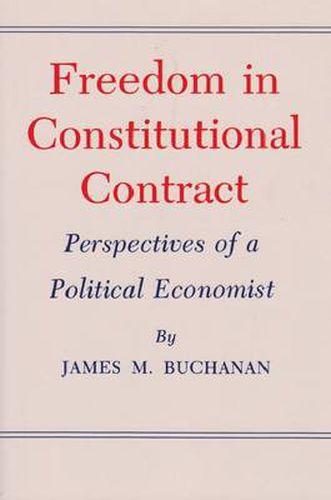Readings Newsletter
Become a Readings Member to make your shopping experience even easier.
Sign in or sign up for free!
You’re not far away from qualifying for FREE standard shipping within Australia
You’ve qualified for FREE standard shipping within Australia
The cart is loading…






This title is printed to order. This book may have been self-published. If so, we cannot guarantee the quality of the content. In the main most books will have gone through the editing process however some may not. We therefore suggest that you be aware of this before ordering this book. If in doubt check either the author or publisher’s details as we are unable to accept any returns unless they are faulty. Please contact us if you have any questions.
Though written by an economist, this book’s subject is not economics in the ordinary sense of that term. Instead, it is James Buchanan’s contribution to what he has called the contractarian revival, the renewed interest in and emphasis on the metaphor of the social contract in evaluating political alternatives. He believes that genuine constitutional dialogue must take place in this country if America is to remain a free society and that the perspectives of an economist are valuable in the discussion of basic issues of social philosophy. The author critically examines the basic alternatives for social order: anarchy, natural law, historical determinism, and revealed reason. He rejects each of these and opts instead for freedom in constitutional contract. In this stance he is explicitly constructivist, holding the view that reform in constitutional-legal rules or institutions is possible.
Reform or improvement in such rules is determined, however, by conceptual contractual agreement or consensus and not by external ethical norms. Further, the choice among alternative sets of rules, alternative constitutions, is categorically distinguished from attempts to suggest policy norms within an existing set of rules. In developing his analysis, Buchanan critically analyzes recent contributions by John Rawls, Robert Nozick, F. A. Hayek, Michael Polanyi, Frank H. Knight, and other social philosophers
$9.00 standard shipping within Australia
FREE standard shipping within Australia for orders over $100.00
Express & International shipping calculated at checkout
This title is printed to order. This book may have been self-published. If so, we cannot guarantee the quality of the content. In the main most books will have gone through the editing process however some may not. We therefore suggest that you be aware of this before ordering this book. If in doubt check either the author or publisher’s details as we are unable to accept any returns unless they are faulty. Please contact us if you have any questions.
Though written by an economist, this book’s subject is not economics in the ordinary sense of that term. Instead, it is James Buchanan’s contribution to what he has called the contractarian revival, the renewed interest in and emphasis on the metaphor of the social contract in evaluating political alternatives. He believes that genuine constitutional dialogue must take place in this country if America is to remain a free society and that the perspectives of an economist are valuable in the discussion of basic issues of social philosophy. The author critically examines the basic alternatives for social order: anarchy, natural law, historical determinism, and revealed reason. He rejects each of these and opts instead for freedom in constitutional contract. In this stance he is explicitly constructivist, holding the view that reform in constitutional-legal rules or institutions is possible.
Reform or improvement in such rules is determined, however, by conceptual contractual agreement or consensus and not by external ethical norms. Further, the choice among alternative sets of rules, alternative constitutions, is categorically distinguished from attempts to suggest policy norms within an existing set of rules. In developing his analysis, Buchanan critically analyzes recent contributions by John Rawls, Robert Nozick, F. A. Hayek, Michael Polanyi, Frank H. Knight, and other social philosophers